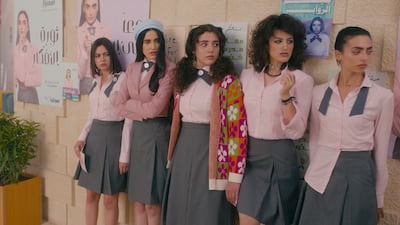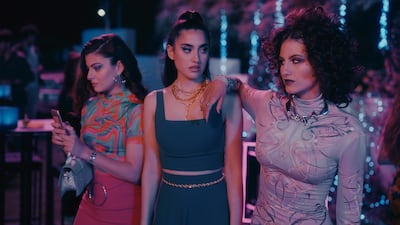The breakout Netflix Arabic original AlRawabi School for Girls is back with a second season – and the high school series remains the best in class.
Created by Tima Shomali, who also directed and co-wrote each of its six episodes, the first series revolves around Mariam (Andria Tayeh), a teenager being bullied at her elite private school. She seeks revenge, which then spirals out of control.
AlRawabi School for Girls was made with such finesse, drama and humour that it was easy to see why Shomali has been called the Tina Fey of the Arab world, a long-standing local reputation that grew global with AlRawabi. It’s also understandable that, even though AlRawabi School for Girls was only meant to be a mini-series, Netflix soon sought a second season from Shomali.
This time around, AlRawabi School for Girls returns to the same prestigious institution but focuses on a new class of equally complex students. Primarily though, the second season depicts the efforts of Sarah (Tara Abboud), a teenager who is tired of being overlooked by her classmates and not being invited to parties. She’s especially wary of her online presence, where she has a pathetic amount of followers.

Sarah believes that all of her fortunes will change for the better if she becomes friends with Tasneem (Sarah Youseff), who isn’t just the smartest and most popular girl in the class, but also boats a huge social media following, where she garners thousands of likes and interactions. Sarah’s attempts to get closer to Tasneem only draw the ire of school bully Hiba (Kira Yaghnam), and she takes great glee in pointing out her obvious efforts to the rest of their class.
Thankfully, Sarah does have a close friend of her own in the shape of Nadeen (Tara Atalla). She hates that everyone is so focused on social media and technology instead of real interactions. She also has the confidence and confrontational attitude to take on anyone who laughs at her mindset. But having such different points of view means that Sarah and Nadeen are drifting apart.
Much like she did with AlRawabi School for Girls’ first outing, Shomali dives into a flurry of timely and challenging themes surrounding teenagers’ obsession with social media and technology.
Not only do we see the brainwashing impact it has on characters, but when some of them do get their way, they can’t even spot the detrimental effect that it has on their real lives. AlRawabi School for Girls consistently explores how many people now want everyone’s attention, but aren’t sure what to do when they get it.
What Shomali once again does so well is make each of the teenage girls feel so real and the challenges they have to face so dramatic.
Shomali’s writing and direction are compassionate and watching Sarah force Nadeen to go to a bowling alley where her crush is playing becomes unbearably tense. Especially once it’s revealed that Tasneem and Hiba are already there, too.

Instead of being judgmental of the characters and their priorities towards their phones, which would leave AlRawabi School for Girls out of touch, Shomali shows how alienated their generation can be, especially by their teachers. One student even declares that they feel like lab rats within the confines of the school.
While the show is proudly Arab, it has the same modern mood and rebellious spirit of other Netflix teen comedies and dramas, like Sex Education and Never Have I Ever.
Shomali also smartly opens up the first episode with a flash forward, where we see the consequences of Sarah’s actions while her voiceover teases things go on to get much worse, before diving back to the start of the school year to show how it all transpires.
This technique, which White Lotus has used deftly in both of its seasons, pulls in audiences and hooks attentions.
Sure, some of the dialogue can be a little too on the nose and the storylines and themes are hardly original. But Shomali explores them in such a heartfelt, authentic and compelling manner that viewers will be just as engrossed by the second season as they were by its first.
Season two of AlRawabi School for Girls is streaming on Netflix from Thursday

